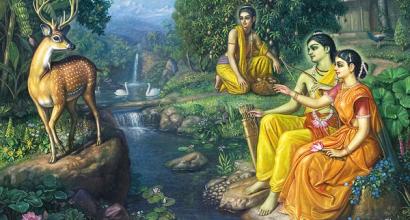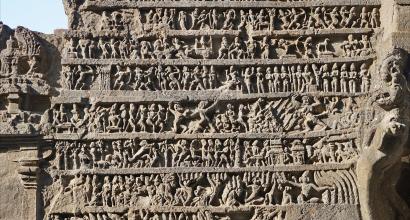As Svapna-vāsava-dattā is the most famous among Bhāsa’s plays and Pratijñā-yaugandharāyaṇa forms its prequel, we took them up for analysis first. In fact, we should have started examining the play Avimāraka; the play is based on stories popular in the folklore. There are many significant reasons to consider this as the first work of Bhāsa.
In the first act of the Avimāraka, we see Kuntī-bhoja looking for a bridegroom for his daughter Kuraṅgī. He appears to be worried about his daughter’s future. This bears semblance to the first act of the play Pratijñā-yaugandharāyaṇa, where we see Mahāsena working towards the marriage of his daughter Vāsava-dattā. It appears as though the portrayal in Pratijñā-yaugandharāyaṇa is an extension of what is seen in the Avimāraka. The play Avimāraka begins with the marriage preparations and ends with the successful wedding. Though the theme of the play is connected with family matters, its events and episodes create a surreal effect – they transport us to an über-worldly realm.
Kuntī-bhoja, the son of King Vairantya wishes to give his daughter Kuraṅgī in marriage to Viṣṇu-sena. But, the potential bridegroom vanishes all of a sudden and no one is able to tell his whereabouts. In the meantime, Kuraṅgī gets caught by a mad elephant while taking a stroll in her garden. She is then rescued by a young caṇḍāla. They fall in love with each other and with the help of the sakhī spend happy moments in the antaḥpura.
We learn from the play that this young caṇḍāla was Viṣṇu-sena, who is also called Avimāraka. He was under a curse and stayed outside Kuntī-bhoja’s kingdom. The king got to know that a caṇḍāla was hiding in his antaḥpura and got him caught; Avimāraka was deeply disappointed, escaped from his imprisonment and rushed to the forest intending to commit suicide. However, a vidyādhara spots him and gifts him a ring that will help him become invisible. With the help of the ring, Avimāraka was able to reenter the antaḥpura of Kuraṅgī.
Kuntī-bhoja did not know this. He made plans of giving Kuraṅgī in marriage to Jaya-varmā; when he was making preparations for the same, Nārada appeared there and told him the reality. Finally, Kuraṅgī gets married to Avimāraka and Sumitrā, Kuntī-bhoja’s second daughter marries Jaya-varmā.
The story of this play is hazy and nebulous; the plot is not well-sculpted and does not seem to be the work of a skilled playwright. There are no aesthetically appealing sequences; the scenes connected with the mad elephant, the appearance of Nārada, nepathya-bhāṣita[1], vidyādhara, the vanishing ring, and other frivolous ones only add to the element of surprise. The plot and the sequences appear artificial and do not enrapture the heart of the audience. Avimāraka was a divine individual born through the blessings of Agni. He had killed a rākṣasa in the form of avi (sheep) when he was young and was thus named Avimāraka. This kṣattriya prince was an outcast as a caṇḍāla; with the help of the women of the palace, he dodges all securities and doors and enters the antaḥpura. The story of his father, the king of Sauvīra getting cursed and the sequence where Sudarśanā begets a son from Agni and hands it over to her elder sister appear strange.
Throughout the play, dialogues between the characters are long and the descriptions are pedantic. The episode where the sakhīs help in the union of the hero and the heroine is full of enticing elements but is not profound. In sum, this looks like a story of the Arabian Nights genre; it appears to be aimed at evoking śṛṅgāra and adbhuta rasas. Therefore, looking at its characteristics, it would not be wrong to guess that this is probably one of the first attempts of the playwright. The poet does not appear to have gained the maturity that made him pen the Svapna-vāsavadatta; the śṛṅgāra and adbhuta in the story do not possess the calibre to culminate in śānta.
The current series of articles is an enlarged adaption of Prof. A. R. Krishnasastri's Kannada treatise Saṃskṛta-nāṭaka. They are presented along with additional information and footnotes by Arjun Bharadwaj.
[1] Speaking behind the screen.














































